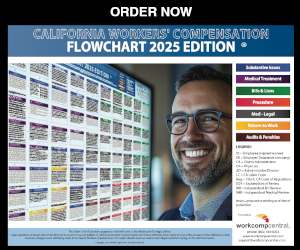Industry Insights
March 16, 2016
Keefe: Dominicks/Safeway Has Runaway Jury Award
- State: Illinois
- - 0 shares
In the second of three recent legal developments involving the intricate rights for claimants with both workers' compensation and civil claims, we are sad to report this somewhat shocking decision against a major U.S. employer.

Eugene Keefe
We also feel Dominicks Finer Foods had a triad of poor risk management, inept human resources and overpriced defense counsel for years. It was our opinion their litigated claims would drag on forever. In this situation, we feel they made a staggeringly poor human resources, legal or claims decision that clearly came back to bite them.
Last week, we learned a runaway jury provided a single Plaintiff a $2.65 million verdict in a retaliation claim against Dominicks/Safeway Inc. Plaintiff-petitioner worked for Dominicks Finer Foods, a Safeway subsidiary. Illinois Workers' Compensation Commission records indicate claimant filed seven different workers comp claims against the company over the years. Dominick's eventually settled all the claims but obviously, they didn’t get a coincidental release/resignation. The defense team at Keefe, Campbell, Biery & Associates always assume we want our clients to get a release/resignation if claimant is leaving your employ at the same time as their workers’ comp claims close.
Either way, during the pendency of the workers' comp claims, Dominicks/Safeway requested claimant submit to an independent medical examination. The IME doctor opined claimant did not have a work-related injury. Although the IME released petitioner to maximum medical improvement and full work immediately with no restrictions, claimant's personal physician recommended claimant remain off all work. Claimant followed his treating doctor's advice.
No one at Dominicks' Human Resources Department, workers' compensation claims or outside counsel told/notified claimant if he was going to remain off work in that fashion, he had to call in absent. Duh. The HR department treated the absences as “unexcused” because claimant didn’t know and didn’t call in. After he had three consecutive “unexcused” absences, Dominick's fired him. During a later workers' compensation hearing, an arbitrator with the Illinois Workers Compensation Commission found claimant could follow his doctor's advice, and ignore the advice of the IME doctor. The Workers' Compensation Commission panel eventually upheld this decision. One has to assume, although we can’t be sure, temporary total disability was awarded by the arbitrator and Commission panel when claimant was off work for these “unexcused absences.”
In the meantime, claimant filed this parallel lawsuit against Dominick’s/Safeway in the Cook County Circuit Court, alleging the company fired him in retaliation for seeking work comp benefits. Dominicks/Safeway maintained claimant was terminated for “legitimate, non-discriminatory reasons,” as he violated its goofy attendance policy in not calling in or showing up for work when the IME reliance by Dominicks mystically required him know about it and do so. Again, the legal controversy arose because he didn’t know and wasn’t told to call in.
Claimant sued for damages due to this HR determination to terminate him based on “no call, no show” and the lack of notice of the need to call in. A Cook County trial judge found Dominick’s kooky change in absence coding was inappropriate. The judge further ruled Dominicks discriminated against Claimant as a matter of law by terminating him while claimant’s comp claim was still pending.
The Illinois Appellate Court reversed the trial court’s grant of summary judgment and sent the matter back for trial on the question of whether Claimant’s termination was causally related to his exercise of his rights under the Workers' Compensation Act. The Appellate Court specifically found the employer had improperly relied upon the opinions of the respective IME physician in its decision to change the employment and call-in status of the employee. However, the court further found the employees nevertheless had the burden of establishing all elements of their causes of action in order to seek recovery under the tort of retaliatory discharge. Although the Appellate Court ultimately decided it was wrong for the employer to terminate the employees under its attendance policy based solely upon the IME opinions and the lack of notice of the need to call in, it refused to rule such action would per se cause the employer to be liable for retaliatory discharge and remanded the cases for consideration by the jury.
Why Do We Say It Was A “Runaway” Jury? Well--Where are the Lost Wages?
The employer in this instance failed to communicate directly to each employee their classification status under the attendance policy was changed. Thus, neither employee was on notice that they were required to call in their absences on a daily basis, as the policy required. It is clear an employer who terminates an employee under similar circumstances places itself at significant risk. However, the first and most important part of damages in any retaliation claim is lost wages. Many plaintiff firms won’t even consider a retaliation claim without substantial lost wages.
The problem with lost wages is the Illinois Workers' Compensation Commission can and should have awarded TTD during all periods of lost time — that makes it hard for a jury to award anything. And from what we can tell, the workers' compensation claims were compromised and settled some time ago, certainly long before this jury verdict.
What just happened is a Cook County jury found in favor of claimant and awarded claimant $31,315.50 in medical bills (?), $75,000 for past emotional distress, $50,000 for future emotional and/or psychological damages, and a whopping $2.5 million in punitive damages.
In the absence of any lost wages, we consider that award to be shocking and unfounded.
It also makes little sense to us how claimant could have unpaid medical bills that he could seek as damages in the common law action but were left unpaid in the workers' comp settlements. We also don’t understand how the resolution of lost time would still allow claimant to have such damages for “retaliatory discharge” in the Circuit Court.
While we agree the actions of Dominicks/Safeway weren’t brilliant, the idea of awarding someone who didn’t have any lost time as monetary damages all those punitive damages is hard to comprehend. Understanding we are in one of the most liberal jurisdictions in the U.S. and maybe the world, we don’t feel there is any chance of remittitur or an Appellate Court knocking that award out.
Eugene Keefe is a founding partner of the Keefe, Campbell, Biery & Associates workers' compensation defense firm in Chicago. This column was reprinted with his permission from the firm's client newsletter.
Advertisements
Columns
- Paduda: What's Happening in Golden State Work Comp? 07/18/25
- CAAA: Fireworks Warehouse Blast Exposes Flaws in Safety, Oversight, Accountability 07/16/25
- Gelman: Asbestos Ban Is a Win for Workers 07/14/25
- Snyder: Mediation Confidentiality 07/11/25
- Snyder: Settle and Sue: Don't Let It Happen to You 07/09/25
- Kamin: State Senate Committee to Consider SIBTF Bill 07/07/25
- Anders: Self vs. Professional MSA Administration: Which Is Right for the Injured Worker? 06/30/25
- Geaney: Court Affirms Finding of Police Officer's Joint Employment 06/27/25
- Fricker: A New Era for Comp Subrogation 06/25/25
- Kamin: AI for HR Equals Bad Injury Reporting 06/20/25
- Montgomery: Will DWC Ignore New Law? 06/18/25
- Kamin: 4th DCA Clarifies DOI From Date of Knowledge 06/16/25
- Wade: Are the Old Ways Gone? 06/13/25
- Snyder: Trust Your Intuition 06/12/25
- Montgomery: DIR Director Reportedly Resigning 06/11/25
- Gelman: Supreme Court to Review COVID Compensability 06/06/25
- Paduda: WCRI's New Studies 06/05/25
- Moore: 187 Pages of WCRI State Stats 06/02/25
- Paduda: The Gutting of NIOSH 05/30/25
- CAAA: Left in the Smoke 05/28/25
Now Trending
- Workers' Compensation News
-
Calif. LAO: Second
Injury Fund 'No Longer Aligned'
With Legislative…
Posted on Jul 14, 2025
-
Calif. City Sues
Ex-Cop Accused of Comp…
Posted on Jul 11, 2025Michael Hemming says: “Back when I handled criminal defense I represented a few clients accused…”
-
Calif.
Commissioner Approves 8.7% Rate
Increase, First Since…
Posted on Jul 15, 2025
-
Calif.
Commissioner Says Rate Hike a
Warning of Growing…
Posted on Jul 17, 2025
-
Calif. Committees
Pass Presumption, SIBTF…
Posted on Jul 11, 2025
-
Calif. Jennifer
Osborn Appointed as DIR…
Posted on Jul 18, 2025Jeffrey Gaines says: “Has she ever tried a case at the WCAB?…”
-
Calif. QME Exam
Scheduled for…
Posted on Jul 16, 2025
-
Ntl. Lawmakers Ask
GAO to Probe…
Posted on Jul 16, 2025
-
R.I. Split Supreme
Court Upholds Grant of Duty
Disability Pension for State…
Posted on Jul 16, 2025
-
Miss. Truck Driver
Found Dead in Cab, but Family
Doesn't Get…
Posted on Jul 11, 2025
Jobs
Upcoming Events
Sep 2-4, 2025
San Diego Elevate Workers' Com
We are thrilled to announce that Early Bird registration is OPEN for ELEVATE« 2025! This year's …
Social Media Links
c/o Business Insurance Holdings, Inc.
Greenwich, CT 06836




No Comments
Log in to post a comment